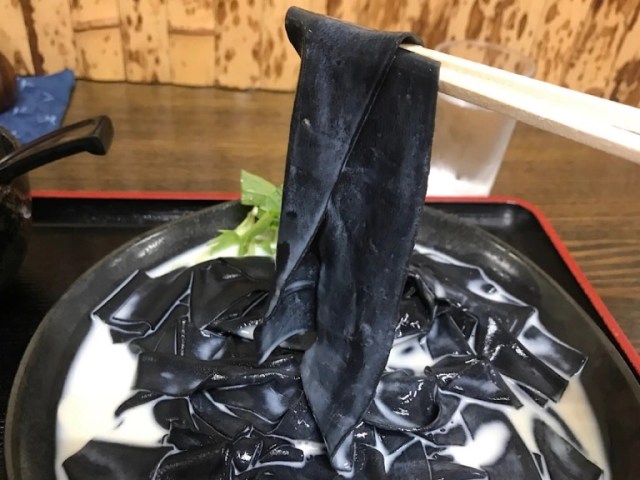
We head to an udon restaurant where they do things very differently.
Usually, the quickest way to differentiate udon from other types of Japanese noodles is visually. Udon noodles tend to be round, thick, and white, making them look different from ramen (thinner and yellow) or soba (grayish brown or green and flat).
▼ A bowl of udon
So when we heard about a restaurant where the udon is not only flat, but pitch-black too, we knew where we were going for lunch: the town of Kiryu, in Gunma Prefecture.
Stepping off the Tobu Kiryu Line at Shin-kiryu Station, we still had a bit of a ways to go to get to Tanumaya, the restaurant serving black udon. Luckily for us there are free-to-use rental bikes right outside the station, so we hopped on one and started pedaling.
It was still before noon, and the town was quiet and peaceful as we rode down the street, admiring the views of the nearby mountains and river.
On foot, it’s about a 30-minute walk from the station to the restaurant, but taking the bike meant we arrived a little before its 11:30 a.m. opening time.
Inside, the interior has a charmingly rustic feel, and while it’s not a particularly big restaurant, the tables and counter seats are laid out in a way that keeps the cozy atmosphere from feeling cramped.
There’s a menu, but we didn’t have to read it to know what we wanted: the Kuro-obi, or “Black Belt” udon, for 950 yen (US$6.75). Our server told us we had our choice of hot or cold broth, and since there was still plenty of lingering summer heat and humidity in the air, we opted for cold.
As we waited for our food, the restaurant started to fill up with other customers, who seemed to be locals and regular diners at Tanumaya. Each and every one of them asked for “curry udon,” making us feel like maybe we were going to be missing out on the real star of the menu, but honestly, there was no way we were going to skip the Black Belt on our first visit.
After a few minutes, our server returned with our food, and, well…
…there’s absolutely no way you can accuse the Black Belt’s name from being misleading!
The noodles get their striking color from edible bamboo charcoal that’s kneaded into the dough (like with the black hamburgers that sometimes pop up in Japan). Making the visuals even more striking is that the broth is soy milk-based, providing not only an intense contrast but also adding a shimmering, glistening effect as you raise the noodles.
Speaking of picking up a mouthful of noodles with your chopsticks, the Black Belt udon is incredibly long. Ordinarily, you’re supposed to slurp Japanese noodles, but the combination of length and width here actually makes it a little easier to fold the noodles around your chopsticks a few times before taking a bite.
Because of how captivating they look, it wasn’t until a few moments had passed that we realized…
…the Black Belt udon comes with a side of curry!
Considering how all the regulars were ordering curry udon, this was a major relief. Tanumaya describes it as a “roasted spice keema curry,” and we’d been provided with an iced side dish so we could enjoy it hot or cold.
The curry combined beautifully with the rich, ever so slightly sweet soy milk broth, with the spicy notes coming on strong but coming to a mild finish as we chewed. The noodles are pleasantly firm, and if you’ve never eaten bamboo charcoal before, don’t worry, as there isn’t even a hint of earthy bitterness to the taste or aroma of the Black Belt udon.
If the color is still too much for you, Tanumaya serves regular-looking white udon too, but for us, in terms of looks, flavor, and fillingness, we came away completely satisfied, though also craving some black ice cream from Ikea Japan for dessert.
Restaurant information
Tanumaya / 田沼屋
Address: Gunma-ken, Kiryu-shi, Higashi 6-7-11
Open 1130 a.m.-2 p.m., 5 p.m.-7 p.m.
Closed Mondays
Website
Photos ©SoraNews24
● Want to hear about SoraNews24’s latest articles as soon as they’re published? Follow us on Facebook and Twitter!
[ Read in Japanese ]